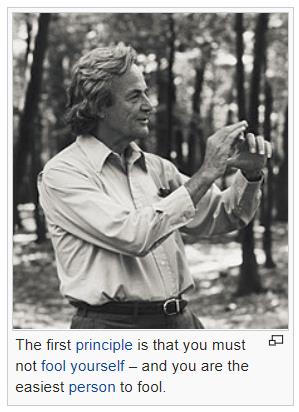
NavList:
A Community Devoted to the Preservation and Practice of Celestial Navigation and Other Methods of Traditional Wayfinding
From: Frank Reed
Date: 2018 Jan 14, 00:36 -0800
John A Brown, I refer you to the warning of the great Richard Feynman:
The first principle is that you must not fool yourself – and you are the easiest person to fool.
It's not exactly brilliant wording, but the concept is fundamental to any experimental measurement. The point of this warning is that all of us (the generic "you" here applies to each and every one of us) are likely to discover, after much diligent hard work, that our pet tools and approaches to things are far more successful than they really are. That's why the idea of experimental "blinding" has become so important in modern science. And, John, I think you have been taken in by your own confidence in, and affection for, your system, big time. As Feynman knew so well, this happens to us, not because we (any of us) lack integrity, but because we passionately want our work to matter. In your notes and your photos, John, we can see incredibly meticulous attention to detail. Really: that's some beautiful work. But precision in note-taking and in aligning your tools does not guarantee precision in measurement, and it cannot translate to accuracy in measurement. You are indeed misleading yourself if you think that you need to include 1 or 2 minutes of arc of refraction correction in your work. And you are misleading yourself if you think your positional accuracy from these observations is better than about 10-15 minutes of arc on average.
Frank Reed
Incidentally, the problem of the penumbra of the Sun's shadow does not go away when you make the apparatus smaller. It scales in exact, direct proportion.







